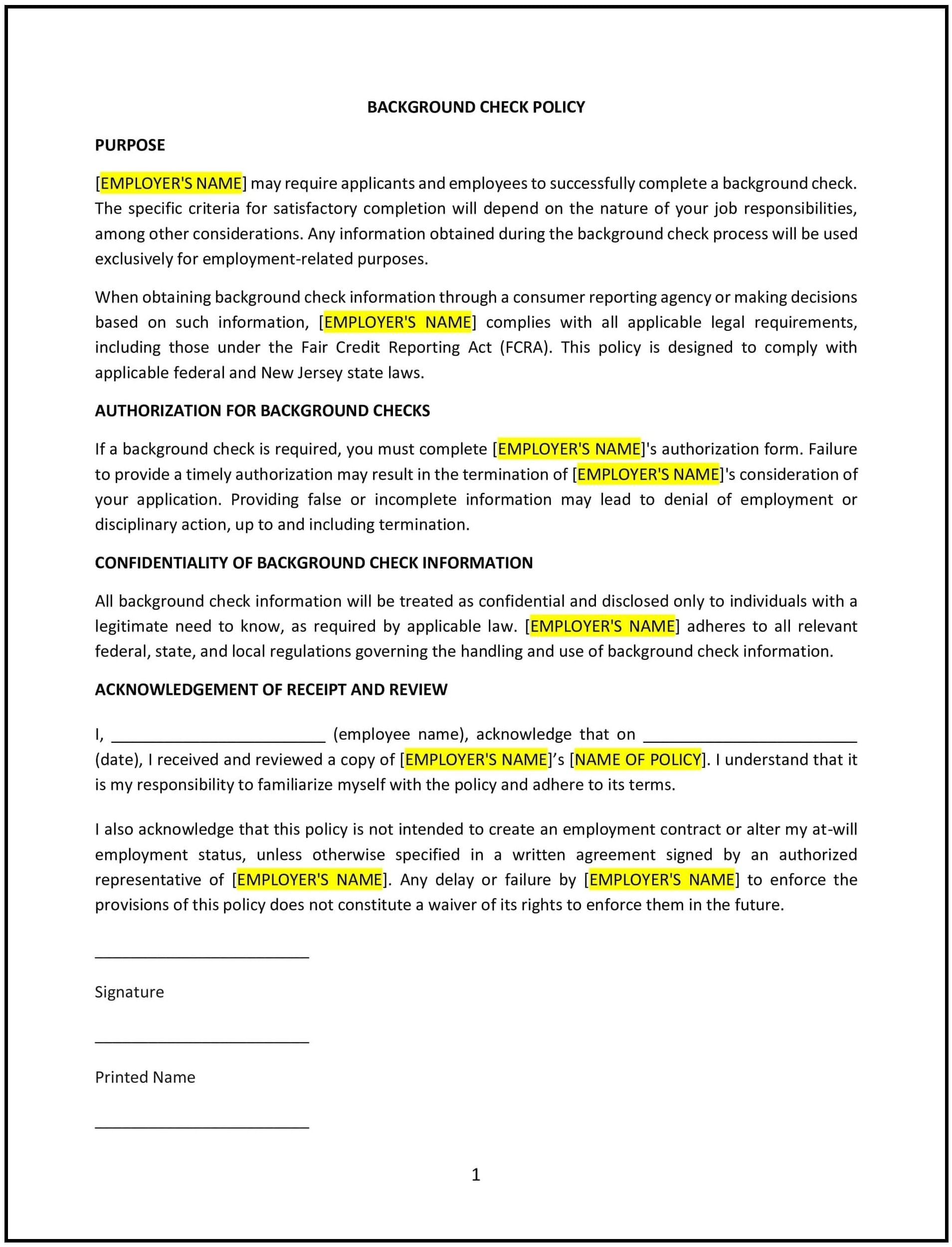Background check (New Jersey) policy: Free template
Got contracts to review? While you're here for policies, let Cobrief make contract review effortless—start your free review now.

Customize this template for free
Background check (New Jersey)
A background check policy helps New Jersey businesses establish clear guidelines for conducting pre-employment and ongoing background screenings. This policy outlines when background checks may be required, what information will be reviewed, and how results will be used in hiring and employment decisions. It also details applicant rights, including notice and consent procedures, to ensure a fair and consistent process.
By adopting this policy, businesses in New Jersey can make informed hiring decisions, protect workplace integrity, and maintain a safe and trustworthy environment.
How to use this background check policy (New Jersey)
- Define when background checks are required: Specify whether background checks will be conducted pre-employment, during promotions, or periodically for certain roles. Outline the positions that require screenings, such as roles involving financial responsibility or access to sensitive data.
- Identify the types of checks conducted: Describe the types of background checks used, including criminal history, credit checks (if applicable), employment verification, education verification, and professional licensing. Ensure the scope aligns with New Jersey laws.
- Obtain written consent: Require candidates and employees to provide written authorization before conducting a background check. Clearly explain the information that will be reviewed and how it may impact employment decisions.
- Outline the decision-making process: Explain how background check results will be reviewed and what factors will be considered when making employment decisions. State that businesses will assess findings based on job relevance and company policies.
- Provide applicants with notice of adverse actions: If a background check leads to an adverse employment decision, inform the applicant in writing and provide them with an opportunity to respond or dispute any inaccuracies.
- Maintain confidentiality: Specify how background check results will be stored and protected, ensuring that sensitive information is only accessible to authorized personnel.
- Review and update: Regularly assess the policy to ensure it reflects changes in New Jersey state laws and business needs related to background screenings.
Benefits of using this background check policy (New Jersey)
This policy provides several benefits for New Jersey businesses:
- Reduces hiring risks: Helps businesses verify the accuracy of candidate information and assess potential risks before making hiring decisions.
- Protects workplace safety: Ensures that employees in sensitive roles meet ethical and security standards.
- Promotes fairness: Establishes a standardized process to evaluate background check results consistently and fairly.
- Enhances trust: Demonstrates a commitment to hiring qualified employees with integrity.
- Mitigates legal risks: Provides clear procedures that help businesses comply with New Jersey background check regulations while maintaining fair hiring practices.
Tips for using this background check policy (New Jersey)
- Communicate the policy clearly: Ensure all applicants and employees understand when background checks may be conducted and how the results will be used.
- Obtain proper consent: Always collect signed authorization forms before conducting a background check to protect privacy and comply with legal requirements.
- Consider job relevance: When reviewing background check findings, assess whether the information is directly relevant to the role and business operations.
- Provide applicants with an opportunity to respond: If a background check reveals potentially disqualifying information, allow candidates to explain or dispute the findings before making a final decision.
- Keep records secure: Store background check results confidentially and limit access to authorized personnel only.
- Review state and local laws regularly: Stay up to date with New Jersey’s background check regulations to ensure hiring practices remain compliant with evolving laws.